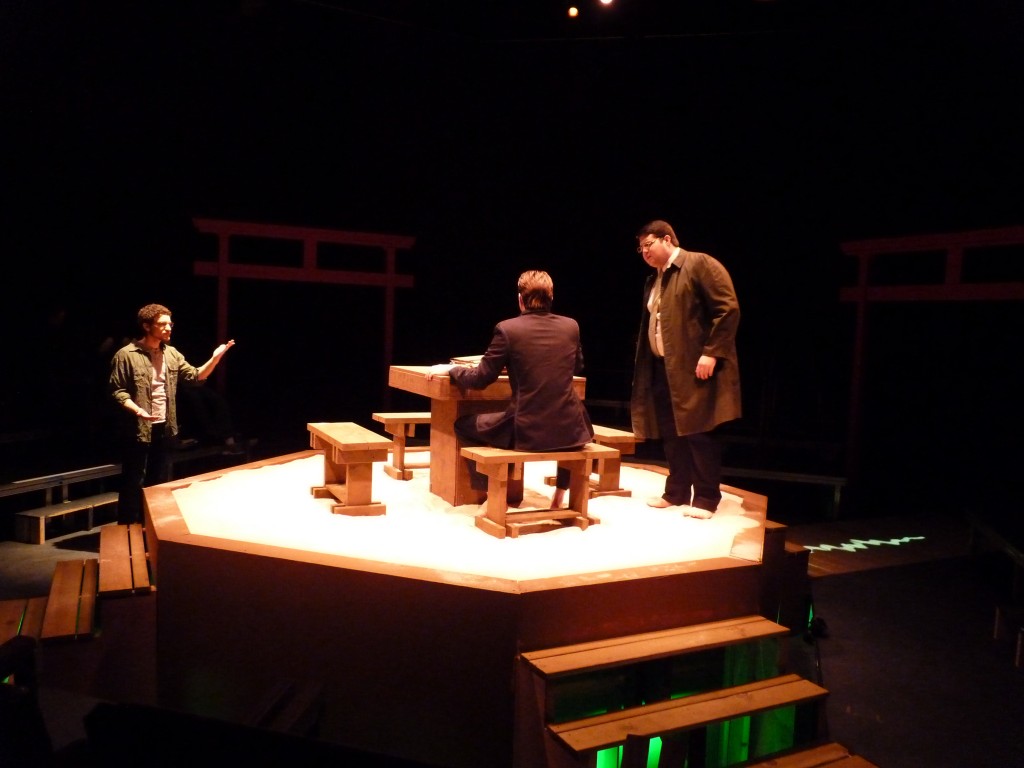On February 28th, Performing Technology: Symposium on Digital Media, Stage and Performative Applications will be presented in the DramaTech Theater. The symposium was organized by Digital Media PhD student Rebecca Rouse and Artistic Director of DramaTech Melissa Foulger. Several Digital Media faculty members are also participating in this symposium, including program director and director of synlab Ali Mazalek. In addition, Brian Magerko, director of the Adaptive Digital Media (ADAM) Lab will present a talk entitled “Creativity, Cognition, and Computation,” focusing on the relationship between the practice of programming and creative expression within the context of performance. Michael Nitsche, director of the Digital World and Image Group (DWIG), will give a talk entitled “What We Talk about When We Talk About Action.” Additionally, Professor Richard Utz, Chair of LMC, is moderating the talk-back after the performance as well as giving concluding remarks, and Dean of IAC Jacqueline J. Royster will be providing an introduction to the whole event.
With a focus on technology in performance, co-organizer Rouse was inspired to organize this symposium based on an undergraduate class that she co-taught with Foulger on the topic of digital technology in theater.
“In addition to discussing the history of technology on stage and some of the current theoretical debates on the topic, we brought the script for after the quake into class,” says Rouse. “Foulger introduced her vision for the play, and then the students in the course designed some elements for the play, including a Kinect-based gesture tracking system and a costume piece with electroluminescent wire sewn into it as well.”

The actor-controlled responsible gesture tracking system uses a Kinect to sense an actor’s gestures, and then sends data to a program created in Quartz Composer. The data that the Kinect captures from the actor’s gestures generates an animated line in Quartz that is then projected on areas of the set.
“Throughout the play, this expressive line represents one character’s role as an author, but later comes to represent the impending threat of an earthquake,” Rouse says.
“We’re using the electroluminescent wire sewn into a costume to help a single actor represent two characters without changing costumes,” Rouse explains. “The lights are controlled wirelessly, and can be turned on to create a more fantastical look for the portrayal of one character, and turned off to create a more naturalistic look for the other character.”
After the success of teaching this undergraduate class and the resulting performance technology, Rouse and Foulger saw an opportunity to organize a symposium on performance and art to run in tandem with the production of after the quake in order to extend the pedagogical experience for the students.
“We also wanted to do this because there is a lot of interest in the arts at Tech right now — there is an incredible amount of research happening on campus that is relevant to the arts in various ways,” explains Rouse. “We wanted to bring together researchers from across campus whose work deals with performance in different ways to highlight the breadth and quality of the work going on, and create a space to facilitate possible future collaborations.”
Some of the other professors participating in the symposium include Dr. Gil Weinberg, director of the Georgia Tech Center for Music Technology, Dr. Tristan Al-Haddad, professor of the School of Architecture + Digital Fabrication Laboratory, and Dr. Aaron Bobick, Chair of the Council of the Arts.
“We were extremely lucky to have Professor David Z. Saltz, the Head of Theater and Film Studies Department and Director of the Ideas for Creative Exploration Lab at UGA, to agree to be our keynote speaker for the symposium,” says Rouse. “Professor Saltz has been creating innovative work on stage with new technology for many years, including work with live motion capture and robotics, as well as making significant contributions to the theoretical work in this area.”
By bringing together professors from different areas of study at Georgia Tech, the Performing Technology Symposium will be an excellent way to discuss the juncture of performance and digital technology.
“The theater has a long and fascinating history with technology,” Rouse concludes. “Some performance theorists today see a major threat to theater in new technologies, but it’s important to remember that like most forms, the theater can adapt and survive. The trick is to figure out how to use technologies in creative and innovative ways on stage that don’t compromise what we love about theater.”
Many thanks to the organizations that contributed generous funding to make this symposium possible: Ivan Allen College of Liberal Arts; School of Literature, Media, & Communication; Graphics, Visualization, and Usability Center; DramaTech Theatre; The Ferst Center for the Arts.
For more information on the symposium, including a schedule and list of presenters, please visit the event website.
For more information about the performance of after the quake, visit the DramaTech website.

